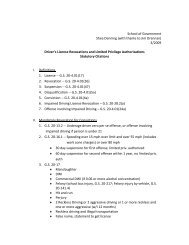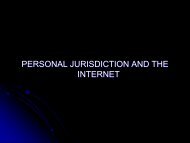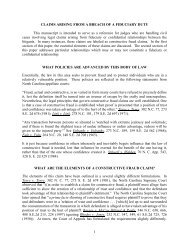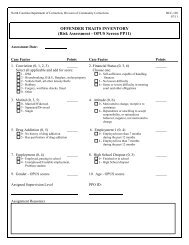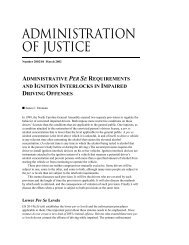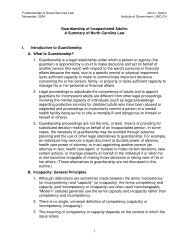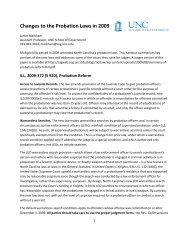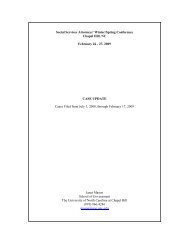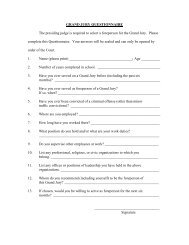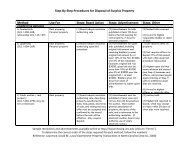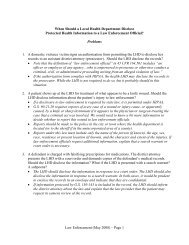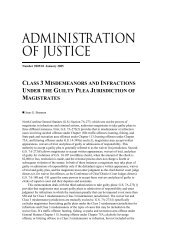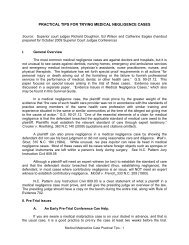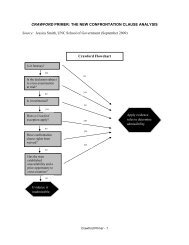Covenants Not to Compete (TROs and Preliminary Injunctions
Covenants Not to Compete (TROs and Preliminary Injunctions
Covenants Not to Compete (TROs and Preliminary Injunctions
You also want an ePaper? Increase the reach of your titles
YUMPU automatically turns print PDFs into web optimized ePapers that Google loves.
y the employee. Henley Paper Co. v. McAllister, 253 N.C.529, 117<br />
S.E.2d 431 (1960).<br />
The time <strong>and</strong> geographic limitations of a covenant not <strong>to</strong> compete must be<br />
considered in t<strong>and</strong>em, such that “[a] longer period of time is acceptable<br />
where the geographic restriction is relatively small, <strong>and</strong> vice versa.” Farr<br />
Associates Inc. v. Baskin, 138 N.C. App. at 280, 530 S.E.2d at 881 (citing<br />
Jewel Box S<strong>to</strong>res Corp. v. Morrow, 272 N. C. 659, 158 S.E.2d 840<br />
(1968)).<br />
e. Requirement that covenant not contravene public policy. Distinction is<br />
between whether there will be an inconvenience <strong>to</strong> the public or whether<br />
there will be a substantial question of potential harm. For covenants not <strong>to</strong><br />
compete concerning doc<strong>to</strong>rs see Iredell Digestive Disease Clinic v. Petrozza,<br />
92 N.C. App. 21, 24, 373 S.E. 2d 449, 451 (1988), affirmed, 324 N.C. 327,<br />
377 S.E. 2d 750 (1989), where the court stated “A covenant not <strong>to</strong> compete<br />
between physicians is not contrary <strong>to</strong> public policy if it is intended <strong>to</strong> protect a<br />
legitimate interest of the covenantee <strong>and</strong> is not so broad as <strong>to</strong> be oppressive<br />
<strong>to</strong> the covenan<strong>to</strong>r or the public…If ordering the covenan<strong>to</strong>r <strong>to</strong> honor his<br />
contractual obligation would create a substantial question of potential harm <strong>to</strong><br />
the public health, then the public interests outweigh the contract interests of<br />
the covenantee, <strong>and</strong> the court will refuse <strong>to</strong> enforce the covenant…But if<br />
ordering the covenan<strong>to</strong>r <strong>to</strong> honor his agreement will merely inconvenience the<br />
public without causing substantial harm, then the covenantee is entitled <strong>to</strong><br />
have his contract enforced”. See also Kennedy v. Kennedy, 160 N.C. App. 1,<br />
584 S.E.2d 328 (2003).<br />
In order <strong>to</strong> determine whether there is a substantial question of potential harm<br />
<strong>to</strong> the public health, the court will examine: (1) the shortage of specialists in<br />
the field in the restricted area; (2) whether the enforcement of the covenant<br />
creates a monopoly in that specialty area; <strong>and</strong> (3) the patients’ interest in<br />
having a choice in the selection of a physician. Statesville Medical Group v.<br />
Dickey, 106 N.C. App. 669, 673, 418 S.E.2d 256, 259, review denied, 333 N.<br />
C. 257, 424 S.E.2d 922 (1992).<br />
The “public policy” requirement has also been used interchangeably with<br />
whether the covenant protects a “legitimate business interest” of the<br />
employer. Professional Liability Consultants, Inc. v. Todd, 122 N.C. App. 212,<br />
218, 468 S. E. 2d 578, 582 (1996); Hartman v. Odell & Assocs., Inc., 117 N.<br />
C. App. 307, 311, 450 S. E. 2d 912, 916 (1994).<br />
7



